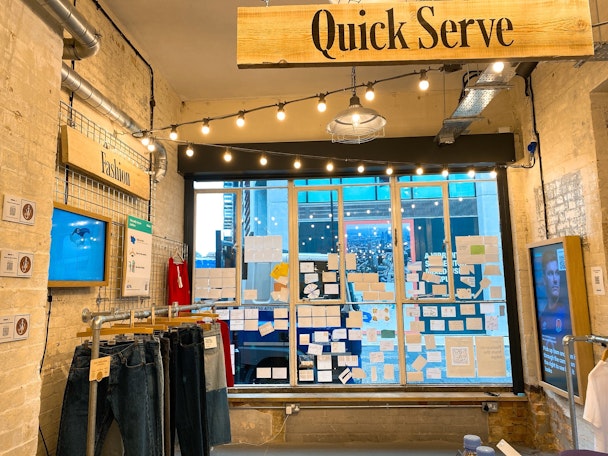CornerShop, the retail shop of the future, part of The Drum Labs, has opened its doors to the public
The Drum has partnered with Capgemini and SharpEnd to launch its concept store CornerShop, a space for testing out pioneering tech innovations and figuring what will work in a commercial setting based on customer feedback.

The Drum has soft launched its highly-anticipated CornerShop space promoting a number of new tech installations.
CornerShop houses a number of new technologies, including connected packaging, and tracks how consumers interact in a physical store, offering brands a place to experiment and improve their customers’ shopping experiences.
”The purpose of CornerShop is to explore the future of retail,” says Cameron Worth, the chief executive and founder of SharpEnd. ”For brands, technologists and consumers, it’s a place to try new things in an environment without constraints. It’s a place to inspire and inform.”
CornerShop is an exploratory playground where real world problems can be transformed and resolved using emerging technologies. Combining different data tracking tools that assess location, engagement, interaction and traditional sales touchpoints, Capgemini has created a cloud data platform to assess the findings in real time and interrogate ways to optimize the customer’s experience and overhaul the store’s operational performance.
The space bridges the gap between the data that marketers capture online versus in-store. Retailers with e-commerce platforms have visibility over countless metrics around how their customers behave online: which items they put in their baskets and abandoned, how long they spent in-store, and so on. However, in a physical space it’s harder to capture and understand a consumer’s engagement and dwell time.
CornerShop’s opening marks the first iteration of the store, with six installations currently on display. This phase of the concept store is about observing how consumers engage with the installations to inform future decisions and develop designs that are actually useful. But CornerShop’s partners are expecting that some of the experiments will need improvement.
Stephen Hewett, the vice-president leading customer transformation at Frog Design, part of Capgemini Invent, explains: ”We’re not sure how people will respond to the space. I think there will be some installations they love, some they won’t understand as we won’t have quite got the experience 100% correct and some they may not feel as excited about as we’d hoped. Getting those real world learnings through and quickly iterating or ending a test is the whole purpose.”
Rob Hollands, who is managing director at SharpEnd, agrees: ”Humans are inherently curious, so we expect to see an appetite for innovation and a desire to discover with an open mind. We hope that they serve a purpose beyond the practical and are capable of delivering meaningful and engaging experiences. It will all come down to how these installations work in practice: are they intuitive? Are they simple to use? Do they solve a genuine problem?”
It’s unknown how consumers will respond to an interactive store sustained by technology and whether it’s a concept they’re willing to explore. The ongoing debate between personalizing customer experiences and protecting their privacy has led both Capgemini and SharpEnd to anticipate some of the possible issues that may arise – namely around whether they will be any resistance or skepticism from shoppers to share their data.
Hewett says: ”Our in-store personalization is built around experiential value exchange – we’re using it to uplift their experience, to either make them feel welcomed, help them seamlessly login to digital touchpoints or virtually try on clothing. It will be interesting to see if these experiences are valuable enough for them to feel comfortable sharing data to unlock them.”
Installations presented in-store aim to answer real world problems in response to a series of research investigations around customer and commercial pain points and opportunities, questioning what the future of physical stores could look like.
Worth explains: ”Brands invest huge sums to develop innovative products and services. So often, these innovations end up locked away in head offices for far too long. Piloting and testing in real environments presents a genuine challenge and it’s this that has created a bottleneck to creativity and innovation in the past.”
Hewett agrees, adding: ”Brands can visit the store to gain inspiration for the future, to think about what’s next for them and get some real world learnings on whether the experiential, operational and technologies realities match our expectations. Hopefully, it will encourage brands to take a few more risks.”
